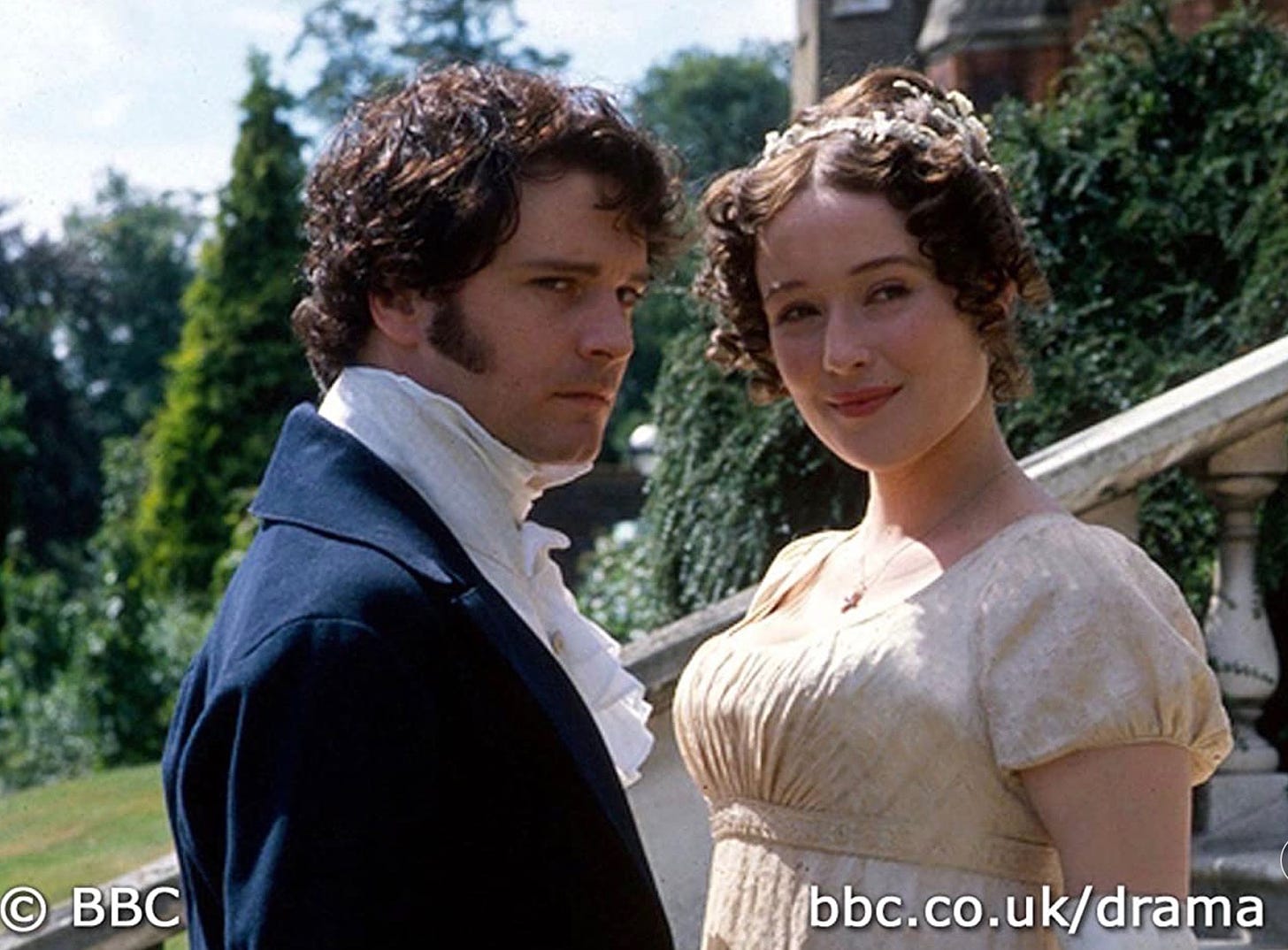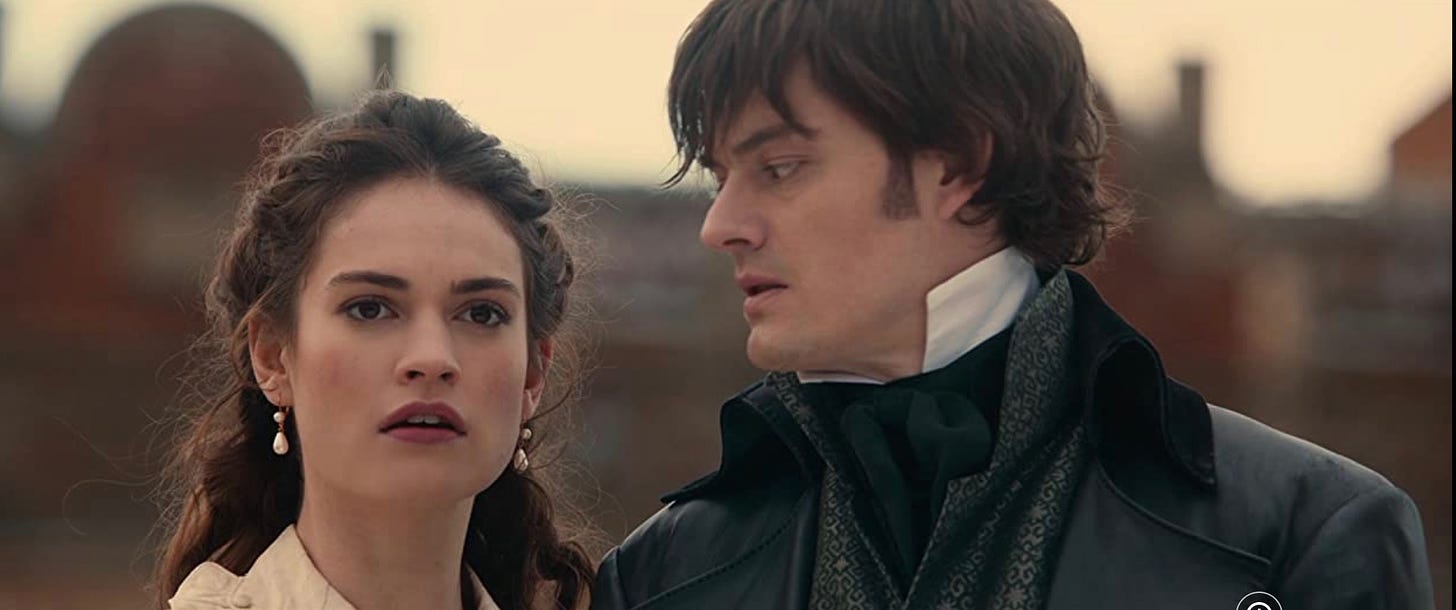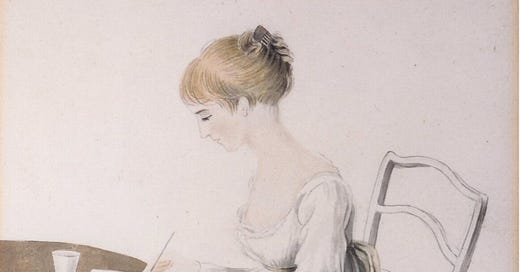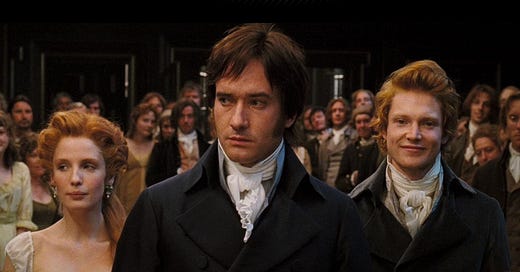

Discover more from The Austen Connection
The Great Jane Austen Showdown
It’s the month of love - we’re deconstructing 'Pride and Prejudice', disastrous proposals, and the sexiest arguments of Jane Austen
Hello friends,
February is here - and it’s a great time to look at the romance and relationships of Jane Austen. So we’re kicking off a Month of Love here at the Austen Connection - and what better place to start than with the fantastic, rollicking, and revealing Arguments of Austen.
Because when you think about it, one of the biggest things going on in Austen’s stories is the arguments. They drive the action, reveal the motives, power the plot, and most importantly they illuminate the inner lives of our main characters in ways that are always enlightening and entertaining.
And sexy! Because Austen is also using the arguments of her books to allow her people to reveal themselves to each other, clash against each other, learn from each other, and ultimately to truly fall for each other.
And in the process - of course - Austen is also telling us, the reader, what she wants us to hear. And we’re still listening!
So we’re going to spend two posts, Austen friends, unpacking the Arguments of Austen in her two most argumentative books - Pride and Prejudice and Emma.

Because Austen is the absolute mastermind of pitting against each other two smart people who we know are going to get together, but meanwhile giving them lots of simmering tension and conflict on the road to romance.
This is fun. So much fun that Pride and Prejudice may be the OG of the hate-to-love trope romcom, where the sparring and bickering map out the road to romance. (For the moment, we’re ignoring Shakespeare - but we’ll come back to him in future.)
And as always, there’s a lot more going on with this simmering and debating than just romantic antics - these arguments contain a vision that examines and challenges and revisions society, politics, the plight of women in the Regency, and the human experience.
Not sure? Let’s convince you!
Over these two posts, we’ll explicate a key passage or two from each. Get ready!
Because these two novels - Emma and Pride and Prejudice - contain outright knock-down-drag-out arguments between our two love interests.
Our passage for Pride and Prejudice you know well, whether it’s something you’ve read and reread or something you’ve watched and re-watched. And if you’re totally new to this scene, all the better - this will be an annotated guide to get you through it!
The disastrous first proposal by Mr. Darcy is a scene that in the 2005 film takes place in a garden temple in the rain, acted out by Keira Knightley and Matthew Macfadyen, and it’s delicious. We 1995 Pride and Prejudice watchers of Andrew Davies’ BBC version have memorized Jennifer Ehle’s and Colin Firth’s verbal punches and counter-punches. And also well deserving of a mention here is the film Pride and Prejudice and Zombies, which makes the sparring explicit by pitting our two people in an actual fight, ending with Elizabeth attempting to stab Darcy with a letter opener.
But what is wonderful to discover and rediscover in the passages - the actual writing - of Pride and Prejudice, is that 210 years ago Austen has already blocked out this entire scene. She tells us how Mr. Darcy stands, how he restlessly paces, where he looks, and reveals to us the physical manifestations of not only his emotions but the effect of those emotions on his physical presence and also on Elizabeth’s.
And in the process both of them seduce us utterly - even while we enjoy the fact that Elizabeth seems actually repelled by Darcy (for the moment) and ultimately manages to put him in his place. There’s so much going on in this scene! Let’s take a look.
Literature’s most disastrous proposal and its seductive blocking
One thing that is so easy to miss if you watch rather than read Pride and Prejudice, and also easy to miss even if you read Pride and Prejudice is the movements - the subtle simmering and jaw-clenching, if not quite hand-flexing (lol) - that Austen gives us in her argument scenes. It’s something we’ll call blocking - not inappropriately since we know Austen loved theater and loved having her novels read aloud, even placed great store in how her novels sounded. She meant her stories to be played, and trippingly on the tongue, as Shakespeare put it.
So let’s dive right into our favorite scene and what may be the most simmering, sexy argument in literary history in the story of Pride and Prejudice and its infamous diabolical first proposal from Mr. Darcy.
Let’s start at the top:
To begin with, Elizabeth sits serenely at home, or rather at Charlotte Collins’s (formerly Lucas’s) home, and is surprised to hear the bell signaling that someone has arrived. Perhaps it’s Colonel Fitzwilliam (Darcy’s cousin), which would be so pleasant. But no!
‘... to her utter amazement, she saw Mr. Darcy walk into the room.”
So she’s immediately on the backfoot with this gentleman who “in an hurried manner” begins enquiring about her health. And: “She answered him with cold civility.”
Here are two sentences and some more simple blocking that in typical Austen fashion seem to give the reader more insight than Elizabeth herself - even though she’s the one in the room with him: “He sat down for a few moments, and then getting up walked about the room. Elizabeth was surprised, but said not a word.”
An unpromising start, but yet we are loving it already. And one thing we notice right away when we decide to explicate this text: The actual proposal itself that follows is a very short four sentences, followed by two long paragraphs that give the play-by-play of Elizabeth’s emotions.
That’s right: This haughtiest proposal in literary history that is still reverberating through 210 years is quoted in four short sentences. And within those four short sentences, one of them is four words: “It will not do.” Another, Mr. Darcy’s opener, is only five words: “In vain have I struggled.”
That’s right: this haughtiest proposal in literary history that is still reverberating through 210 years all happens in four short sentences. And within those four short sentences, one of them is only four words: “It will not do.” Another, the opener, is only five words: “In vain have I struggled.”
This cryptic yet powerful proposal is then followed in the text by two full paragraphs of explanation, wherein the reader gets a front-row seat to Lizzy’s journey through All the Emotions. The proposal itself lands quickly. The psychological examination of its impact on Lizzy is dealt with far longer, as Austen slows down time and takes us through a journey that begins with astonishment and confusion, then moves to anger, and finally finds gratitude and patience, even compassion, only to finally land on: Exasperation. How like Austen to land us there.
He spoke well, but …
And what rational deliberations does Lizzy - and what are we, readers - to land on? As she often does, Austen does tell us what to think. And what we are to think of Darcy’s extremely short declaration is this: “He spoke well, but … he was not more eloquent on the subject of tenderness than of pride.”
This observation is of course from the narrator, but the narrator at this point is speaking through Elizabeth’s viewpoint in one of Austen’s innovative and multilayered techniques that weaves subjective viewpoint into objective narration.

And now we have more “blocking,” which in theater refers to where people stand, sit, and move on stage - but here in Austen it’s that but also her blocking includes descriptions of emotions that are made plain in those movements and expressions.
For instance, here’s Elizabeth immediately after this rushed declaration: “She stared, coloured, doubted, and was silent.”
This is not the Elizabeth we think we know! Because it’s easy to forget that - like the rest of us - Elizabeth can sometimes in the face of a rushed and unwanted declaration of love, be actually speechless, and “silent” in astonishment - a tongue-tied silence everyone can relate to, and which makes us root for her.
Elizabeth commences on an emotional journey during Darcy’s initial speech, and it’s quite a journey that includes the following: “staring” astonishment; cool observation of his “eloquent” yet “wounding” words; “deeply-rooted dislike” of her suitor; acceptance of the “compliment of such a man’s affection’; and also feeling “sorry for the pain he was to receive” because she already knows she’s about to reject him. And from there we progress to being “roused to resentment” until finally Lizzy loses “all compassion in anger.” Quite a journey, already.
Darcy’s actual words have faded to the background - we’ve already in fact heard enough in the first four sentences - and Lizzy’s own thoughts and perception take the foreground in this novel that as we have discussed turns all things upside down.
And even after two paragraphs of emotional journey, Lizzy now instructs herself to “compose herself” “to answer Darcy with patience.” What a ride!
Then, finally, as Darcy speaks she lands on: exasperation!
And what gets Lizzy finally to the point of exasperation? It’s our favorite thing about this scene, and one of our favorite things about Austen: Lizzy moves from her patience and compassion to aggravation when she observes that Darcy has “no doubt of a favorable answer.” And she further observes: “He spoke of apprehension and anxiety, but his countenance expressed real security.”
Darcy is super sure of himself, and Lizzy has zero time for it.
And let’s point out here that Lizzy has not even spoken yet! The argument is not even started, this is just the preamble.
Then, Elizabeth starts in.
Her answer, which reaches us after those two long paragraphs detailing the journey through her emotions, is six sentences long, to Darcy’s four.
Her sentences are longer. And they are almost biblical in their instructive merit. Lizzy begins by talking of how “such cases” should call for gratitude but she “cannot.” And perhaps she should thank him, but she again “cannot.” And she lands this zinger: “I have never desired your good opinion, and you have certainly bestowed it most unwillingly.”
Pretty much says it all. But we’re just getting started.
Because now - wait for it - what follows is a full paragraph explicating what happens to Darcy.

What happens to Darcy, annotated
While we all recognize those words - Mr. Darcy’s proposal and Lizzy’s reply - especially if we’ve seen the films, what cannot be adapted for the screen are what might be the best parts of these scenes. Again, it’s Austen’s physical blocking, the emotional play-by-play that attends them, and the theatrical force lent to these interactions and arguments.
Here’s what happens to Darcy, and it’s worth reproducing here in full, and with our own interrupting annotations:
Mr. Darcy, who was leaning against the mantle-piece with his eyes fixed on her face
[This is a posture full of power and presumption, friends - the full-on male gaze.]
seemed to catch her words with no less resentment than surprise. His complexion became pale with anger, and the disturbance of his mind was visible in every feature. He was struggling for the appearance of composure, and would not open his lips, till he believed himself to have attained it.
[This is a fancy way of saying: She’s got to him! She already had, but now she really has. This powerful, prideful guy is totally within her grasp - but struggling not to show it. Furthermore, we the reader can see it and Elizabeth cannot.]
The pause was to Elizabeth’s feelings dreadful.
[But not to ours - we’re relishing this!]
At length, in a voice of forced calmness, he said, …
And this is where the actual knock-down-drag-out argument commences. Everything up to now has just been a warm-up.
And what’s amazing about this argument of Austen is that all of this talking is followed by its emotional background followed by rational observation followed by more feeling followed by rational adaptation of what’s being said into a lesson about human character - and all of this is going through these characters’ minds and complementing every speech of the argument! And we have a front-row seat.
Continuing on, Darcy begins to inquire as to WTF.
Elizabeth answers to the effect of: I might ask you the same thing!
And now Darcy is about to learn something, as he asks in what is a question but sounds more like a declaration: “And this is all the reply” I’m to receive.
And now Lizzy takes the offense. She brings in Jane. For those of you who might not know the backstory here, Jane is Lizzy’s perfect, wonderful, kind sister, who has fallen for Darcy’s best friend - and Lizzy has learned that Darcy has influenced his friend to separate from Jane. Lizzy rallies her thoughts, and thinks of Jane. And now we know things are not going to go well.
One can feel the magnetic force of the planet shift a bit as Lizzy does this mental rallying and takes the opportunity to tell Darcy that no matter what she might have felt for him in an alternate universe, she certainly wouldn’t have pledged her life to anyone who could get in the way of her sister’s happiness.
And here we have a sentence that shows the reader, as Austen so brilliantly does with her layered narratives, that even though these two are arguing it’s just possible they might belong together, as she shows us something simple yet profound: “Mr. Darcy changed colour; but the emotion was short, and he listened without attempting to interrupt her while she continued.”
Really, a powerful, haughty, aristocratic man in Regency England, “listened without attempting to interrupt her while she continued”?
Let’s just take a moment to point out that Austen could have just said there, if the argument itself were all she was interested in, “He listened.” Period. But no - Austen makes it clear to all that not only is Darcy listening, but he’s actively listening. He’s keenly interested.
Let’s just take a moment to point out that Austen could have just said there, if the argument itself were all she was interested in, “He listened.” Period. But no - Austen makes it clear to all that not only is Darcy listening, but he’s actively listening. He’s keenly interested.
If we needed a sign that these two humans could have a life together, it is in the words “he listened without attempting to interrupt her while she continued.” Do we hear an amen at the back?
Misery of the acutest kind
And what comes next as Darcy listens is that we have Elizabeth revealing crucial aspects of her feelings and her beliefs and her character to Darcy. While he listens.
He will remain a mystery, and will - beautifully, compellingly, as often in Austen - reveal himself further through letters. But for now, this is the part where Lizzy lays into him, accusing him of separating the nicest girl in the world, Jane, from the nicest guy in the world, Bingley, and causing both “misery of the acutest kind.”
Here we see the power of listening - because if Darcy weren’t actively listening this is what he would miss: Lizzy openly and passionately revealing something profound about herself, and her sister. That she is a defender of love. That she is loyal to family and friendship. That she views marriage as an act of love in a time, and certainly in Darcy’s life, where marriage is seen as transactional. She is revealing that she is not just defending her sister, but she’s defending love and friendship and marriage and the pursuit of happiness and she’s willing to speak up for it and attack anyone who gets in the way of it.
Darcy’s reaction? You bet, we get that too: “She paused, …he was listening with an air which proved him wholly unmoved by any feeling of remorse. He even looked at her with a smile of affected incredulity.”
“Can you deny that you have done it?” she repeated.
Friends, amidst this haughtiness and power, this downright rakish and villainous (move over, Lord Byron) “affected incredulity,” Elizabeth is not only speaking to it, defending love against it, but she has the strength of body and mind to “pause” in the face of it, and repeat her question, and insist on an answer.
She’s a badass!
And Darcy to his credit is letting himself be shown the badassery. He’s not only learning something about Elizabeth, he’s learning something about himself: And we will learn later that it’s the first time anyone has helped him to this kind of painful self-reflection. Everyone else - including his parents, he explains at the end of this story - have declined to call him to account.
Friends, amidst this haughtiness and power, Elizabeth is not only speaking to it, defending love against it, but she has the strength of body and mind to “pause” in the face of it, and repeat her question, and insist on an answer. She’s a badass! And Darcy to his credit is letting himself be shown the badassery. He’s not only learning something about Elizabeth, he’s learning something about himself.
So Darcy now replies with “assumed tranquility.” He is still struggling, and we are left to observe the effects of Darcy’s emotions and imagine what they suggest, unlike with Elizabeth where we are allowed to witness her full range of feeling and reasoning.
And Darcy by the way lands a punch here that is truly painful, and he does it with his assumed tranquility and his mantle-leaning calm, to tell her: “Toward him [Bingley] I have been kinder than myself.”
This would be a hard one to recover from: Darcy is basically saying he looked after his friend, Bingley, by putting a stop to his marriage to Lizzy’s beloved sister, even while acting inadvisably for himself by making this here proposal to Lizzy. Ouch.
But Elizabeth is still not done yet, and after the briefest moment she shrugs it off and launches right in to tell him off for being so beastly, also, to Wickham.
We don’t know yet that Wickham is a villain, and this is why it’s so much fun to re-read Austen - layers are added with each reading of this story.
But while Austen slows time down to give us Lizzy’s emotional play-by-play at the beginning of this argument, now Austen takes us backward in time as Lizzy manages to take the sting out of Darcy’s last strike by leaping backward over the chronology to say, actually: “Long before it [the Bingley-Jane thing] had taken place, my opinion of you was decided.”
Lizzy is reeling and grasping for words - and, it has to be said, finding words that highlight her own agency, her own judgment, her own opinion, and delivering those words in a way that assumes her own power. (We may have thought the reeling and grasping and striking and leaping Elizabeth started with Lily James in Pride and Prejudice and Zombies, but here it is in Austen!)
Lizzy is not waiting on anyone’s permission to rally and rationalize her own opinion and deliver it as if it were an edict from on high. Even if no one wants it, she’s giving it anyway.
And with the conjuring of Wickham, Lizzy has landed a solid punch to Darcy. His assumed tranquility ruffles a bit now.
“‘You take an eager interest in that gentleman’s concerns,’ said Darcy in a less tranquil tone, and with a heightened colour.”
But still, he is listening, even as his color changes.
And Lizzy is still showing aspects of herself: With the Wickham telling-off, she’s revealing that she is a defender of not only love as in the case of Jane and Bingley, but also of justice and equality, and human kindness and consideration.
“You have reduced him to his present state of poverty,” Elizabeth accuses. And in doing so, she shows that she can and will stand up for what is right and fair, even in the face of mercenary opportunity and in the face of haughty power and insults.
‘You have done all this!’
And now things are heated, friends. Lizzy works herself up to some exclamation marks: “You have done all this! And yet you can treat the mention of his misfortunes with contempt and ridicule.”
Now Darcy is shouting back, and walking “with quick steps across the room”: “And this … is your opinion of me!”
Oh, it’s getting good.
Funny that Lizzy’s indignation and ranting is on behalf of others, while Darcy’s reaction - we love this! - is about himself: “your opinion of me!” How dare you! Tee hee.
And these outbursts and anger and passions all now begin to screech and fly back down the hill on this roller coaster of Austen Argumentation, and it turns a screaming corner when Lizzy feels “herself growing more angry every moment” but she yet speaks “with composure” when she delivers another of our favorite punches, a fatal one, declaring that it’s actually nothing about her own family or status but rather Darcy’s bad manners that have “spared me the concern which I might have felt in refusing you, had you behaved in a more gentleman-like manner.”
And there we are: The status-insecure, poorly-connected Lizzy is crowning all of her impassioned speeches on behalf of her sister and on behalf of love and on behalf of justice and friendship, with a simple salvo to Darcy that: he is not after all a gentleman.
This is all Darcy’s got! His gentleman-likeness is it, friends! He is nothing if not this! Later, after we’ve already read and watched this thing a hundred times, we can think of Pemberley, think of privilege, think of immense power and 10,000 pounds a year. Think of Mrs. Reynolds!
And even with all that wealth and approbation since boyhood, what it all comes down to is: You’re not enough for me, sir. Because you are not a gentleman.
This is about more than just Lizzy and Darcy, friends, right? This is Austen calling into question and turning upside down all our notions, in 1813 and in 2023, about privilege and value and status and what’s respectable. What’s powerful. Austen is causing us here - along with Darcy - to question everything we think we know about all of it.
You might have more of it all than I do, Lizzy seems to be saying; but I have my heart, I have my head, I have my good opinion or otherwise. I will find my own power and my own voice, and you’re going to stand there and hear it.
You might have more of it all than I do, Lizzy seems to be saying; but I have my heart, I have my head, I have my good opinion or otherwise. I will find my own power and my own voice, and you’re going to stand there and hear it.
So what happens next?
Elizabeth keeps talking, Darcy keeps listening, and she graciously explains, again invoking time as well as judgment and emotion: “I had not known you a month before I felt that you were the last man in the world whom I could ever be prevailed on to marry.”
Why does she say, “I had not known you a month”? Again, she is making a Lily James-like leap backward through time and lifting herself out of the path of his painful insults to make it clear that his treatment of Jane and his own friend Bingley, his treatment of his childhood mate Wickham, though bad, they are not the point: The point for Lizzy is that she sized him up right away, judged his manners as lacking and haughty, and she would never then, does not now, and will never in the future, have time for him.
Harsh!
And his reply, after all this listening: “You have said quite enough, madam. I perfectly comprehend your feelings.”
Darcy has listened, with admiration, he’s even issued a follow-up question at one point although of course a devastatingly insulting one - “Could you expect me to rejoice in the inferiority of your connections?” - and now things are settling into a calm, ravishing, exhausting disappointment for both of them.
He “hastily” leaves the room.
And something we had forgotten about Lizzy - while she has the stand-up-and-deliver, we also as readers are with her in the impact that this encounter has, and it’s an impact that is easily forgotten: She is in pain. She cries.
Here it is:
“The tumult of her mind was now painfully great. She knew not how to support herself, and from actual weakness sat down and cried for half an hour.”
Not just “she cried”; but she “cried for half an hour.”
A reminder that you can stand up to it all, you can defend, and you can speak, and it is always going to be courage and pride and intelligence that carries you - but you are not expected by this author to do so without feeling the pain, without confusion, and even regret.
We love this about Austen - after socking it to power, we are with our heroine both in the triumph and also in the impact, when the impact hits and hit it will.
But meanwhile the important fact remains: We stood up, we delivered, for ourselves and for our sisters, for love and friendship and justice - we spoke truth to power, Lizzy to Darcy.
It’s a book! It’s not real life, and it’s not really happening and unfortunately nor will it necessarily, ever, in Austen’s life or in ours.
But yet we’ve got it here, in writing, through fiction, and no one’s going to take it away. It’s here for us to read it and live it and re-live it in the book, on the screen, on the stage. This usurping of the established order of things happening even within a marriage plot, a romance, and a seduction.
It gives us joy, and romance, desire, and power.
And here it will remain, friends. You always have it. It’s a gift Austen gave us through her writing and art, and it’ll continuing giving - in this month of love and beyond.
—------
But what do you think, friends?
What is your favorite Austen argument? Is it this one? Do you like Fanny Price standing up to Edmund and telling him a thing or two (even though he rarely listens)? Do you love the climactic Anne Elliot speech - spoken not to Wentworth but rather delivered in the way all the arguments of Persuasion are delivered, through a process of overhearing? Do you love the Knightley-Emma debates? Let us know what you think, what you’re reading, what you love about the hate-to-love trope!
Stay tuned for our upcoming post “The Great Austen Showdown: Emma and Knightley.” If you subscribe, it’ll come right to your inbox.
Also, coming up - continuing the Month of Love with our long-anticipated (thank you for your patience, readers) podcast episode with Regency romance author Felicity George talking about how contemporary romance writers are updating our heroines and heroes while retaining all the steam you want in your romance stories.
Also coming up - much-anticipated (again, thank you for your patience) podcast episodes with two heavyweight Austen thinkers: authors John Mullan and Robert Morrison. Also, we have a whole series penned out on Jane Austen and Democracy - and what Jane Austen has to say about division, disinformation, and our political lives. Planned for January - well, we took January off, friends - so it’s now planned for March and never fear all this too will land right into your inbox.
See more on what’s coming up and cool links and community, below.
Have a beautiful weekend full of exciting, revealing, and romantic argumentation.
Yours truly,
Plain Jane
Cool links and Community
The quotes in this edition of the Austen Connection are taken from the Norton Critical Edition of Pride and Prejudice, edited by Donald Gray and Mary A. Favret
In Pride and Prejudice and Zombies, Lily James and Sam Riley really get into it - it’s all there in Austen, just taken to its logical conclusion that’s all. You’re welcome:
You can visit the garden temples and the location of the 2005 ‘Pride and Prejudice’ proposal scene at Stourhead, a National Trust property in Wiltshire, England.
If you need to re-watch this scene that you’ve already watched a thousand times, here it is - and you can observe the potent emotional mixtures of haughtiness and surprise, rage and passion, pain and defensiveness that are also right there in Austen’s text. Enjoy:
And finally, where would we be without this? With all due respect to Andrew Davies, it’s Jane Austen that gave us everything we need in this scene, from the pacing and the puzzling to the indignation and the perturbation, right?! Enjoy!
If you enjoyed this Austen Connection post, feel free to share it!














I will always see this argument, this scene, as my favorite of all time, but I especially appreciated the reminder to go back to the text. Lovely unpacking of it all. In addition, since I am soon going to be editing my current work, with a number of argument scenes between protagonists, it was an important reminder to include that blocking, to the best of my--compared to Austen--abilities. I tend to concentrate on just the words, not enough on the very physicality of a scene. Thanks!
I argue that complexity and layered conflict, along with ethical dilemmas define all of Austen’s work—and that you’re using, with much wisdom, an expansive definition of “rom-com”, and I admire you for the way you’re doing this. Though girl gets boy, a helluva lot more is going on—and you prove that. I have a memoir that relies on rom-coms and that I define in a chapter entitled “Let the Rom-Coms Roll” this way: “Two cynics meet, neither believes love works, one or both have been hurt or screwed by believing that the open heart is a good thing. So one, or both, have closed off that option: closed heart, closed heart.” In the best ones, we do get more complexity.
The difference and power here in Austen’s novel that you’ve so eloquently proven is that both characters, Lizzy and Darcy, are pressured by internal forces and external forces, layered in with complexity. The two are challenged by outside pressures and internal ethical conflicts about behavior—that you discuss so well here and in the link you provide to an earlier post. The internal pressures deal, for each character, with questions of goodness and pride. Austen does this with exquisite omniscient narration that focuses her camera out in the opening sentence of the novel and then expertly in for the characters she cares most about—much like a fab director.
That’s why 210 years later we're still reading her and making wonderful films about her books.
And because you’re doing such brilliant work here, I’m trying to get you to take a date under your own byline in April from me and two of my colleagues for https://innerlifecollaborative.substack.com — I’ve written from my personal email mltabor@me.com and am hoping you’ll take a look and let me know … In any case, I think this Substack is brilliant. xo ~ Mary